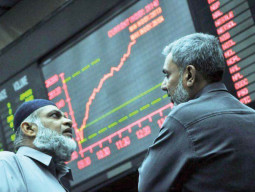
It was the second revision in the project’s cost in less than four years, which the Central Development Working Party (CDWP) approved without looking at findings of an inquiry conducted by a former chief justice of Pakistan into allegations of corruption in the mega project.
Planning Minister Ahsan Iqbal chaired the CDWP meeting.
The CDWP also approved almost 25% increase in the cost of Chashma Nuclear Power Plants III and IV. The revised cost of the power plants is now Rs233.9 billion, up Rs44 billion.
The 630-megawatt Chashma III has already become operational while Chashma IV, having a similar generation capacity, will start running by October this year.
CDWP clears three CPEC-related projects
The Pakistan Atomic Energy Commission had sought an increase of Rs29.2 billion in the cost of these projects on account of exchange rate impact. An additional Rs5.7 billion was approved for auxiliary contracts while Rs3.4 billion was cleared for change in the scope of work.
Of the Rs44 billion additional cost, Rs14.7 billion will be given from the Public Sector Development Programme.
The cost of power plants also rose because of increase in salaries of employees, high utility bills, increase in prices of vehicles and high rates of duties and taxes.
Both the Kachhi Canal and Chashma power projects will now go to the Executive Committee of National Economic Council (Ecnec) for final approval.
Cost of delay: Kachhi canal project cost has risen five times, says committee
Kachhi Canal
General Pervez Musharraf-led government had approved the project at a cost of Rs31.2 billion in 2003 for irrigating 713,000 acres of land in Balochistan. The plan envisaged provision of 6,000 cusecs of water to Balochistan districts through the construction of a 500km-long canal from the Taunsa Barrage, Punjab.
However, the project suffered since the beginning due to the irregular award of contracts and compromises on the quality of work. The PML-N government reduced the scope of the project from 713,000 acres to just 72,000 acres and still the cost went up 258% from the original cost of 2013.
It was the second revision in the cost and scope of the project by the PML-N government and that too without addressing its shortcomings.
The government first revised the cost to Rs57.6 billion in December 2013 and made the second revision on Tuesday without taking the culprits to task.
Prosperity delayed : Factors delaying Kachhi Canal project explained
Some high-ranking officials of the Water and Power Development Authority (Wapda) were involved in corrupt practices, according to officials privy to the findings of investigations.
“The project is a troubled venture facing an ongoing inquiry into technical soundness and financial transparency by a committee constituted by the Council of Common Interests,” said the project documents.
“Several technical shortcomings have been identified during the technical and financial audit of the project,” they said. The project has become an illustration of lacklustre implementation and ill-planning, according to the documents.
The Kacchi Canal project is not the only case facing serious financial issues as the Neelum-Jhelum project has also met a similar fate. Its cost has swelled to Rs500 billion from just Rs274 billion.
The Planning Commission found shortcomings even in the revised project but still the CDWP approved it.
Against the Rs4 billion allocation for new contracts in the 2013 revision, the CDWP on Tuesday sanctioned Rs12 billion. For engineering and administrative expenditures, Rs7.4 billion was approved, up from Rs1.2 billion in 2013.
CDWP clears Kurram Tangi Dam project
According to an understanding reached between the Ministry of Water and Power and the Ministry of Planning and Development, Wapda will operationalise the project by August this year by providing water for 55,000 acres of land.
The planning ministry will release Rs10 billion in the next three months to support the construction work.
Wapda will certify the irrigation of 72,000 acres by December 2017 and the planning ministry will release Rs13 billion in the next financial year 2017-18.



1730959638-0/trump-(19)1730959638-0-165x106.webp)













COMMENTS
Comments are moderated and generally will be posted if they are on-topic and not abusive.
For more information, please see our Comments FAQ